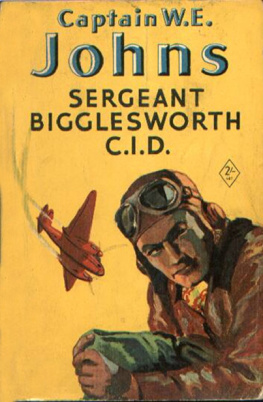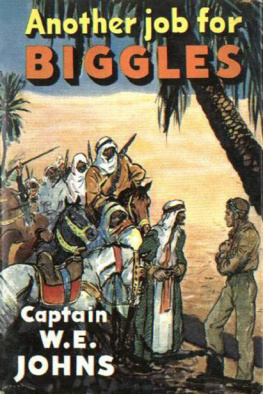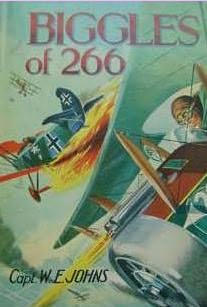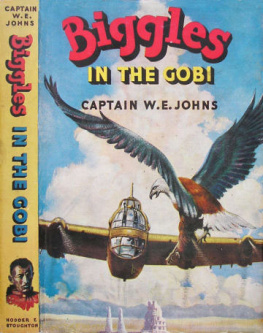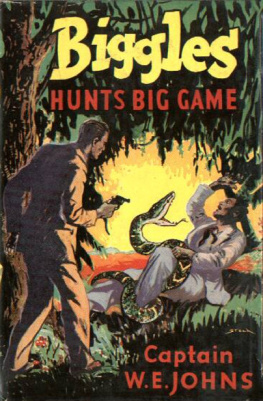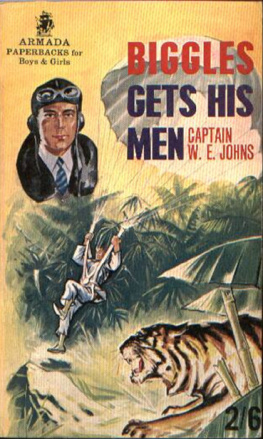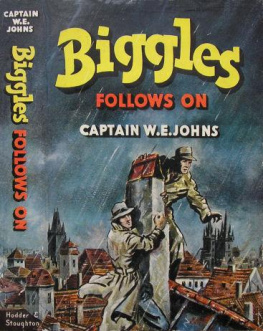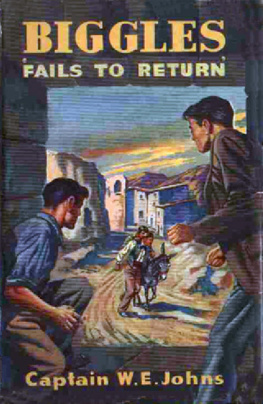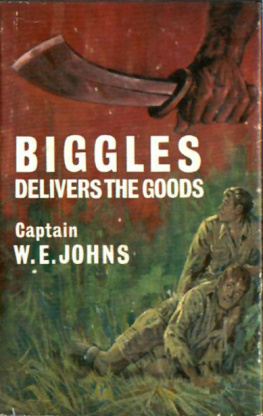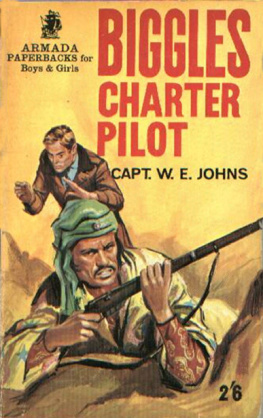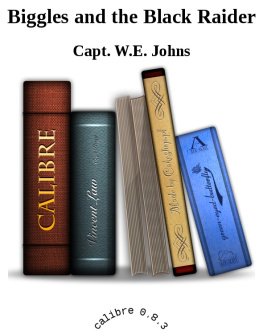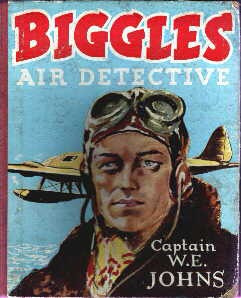Captain W. E. Johns - Sergeant Bigglesworth C.I.D: The first post-war Biggles story
Here you can read online Captain W. E. Johns - Sergeant Bigglesworth C.I.D: The first post-war Biggles story full text of the book (entire story) in english for free. Download pdf and epub, get meaning, cover and reviews about this ebook. year: 1947, publisher: Hodder & Stoughton, genre: Detective and thriller. Description of the work, (preface) as well as reviews are available. Best literature library LitArk.com created for fans of good reading and offers a wide selection of genres:
Romance novel
Science fiction
Adventure
Detective
Science
History
Home and family
Prose
Art
Politics
Computer
Non-fiction
Religion
Business
Children
Humor
Choose a favorite category and find really read worthwhile books. Enjoy immersion in the world of imagination, feel the emotions of the characters or learn something new for yourself, make an fascinating discovery.
- Book:Sergeant Bigglesworth C.I.D: The first post-war Biggles story
- Author:
- Publisher:Hodder & Stoughton
- Genre:
- Year:1947
- Rating:3 / 5
- Favourites:Add to favourites
- Your mark:
- 60
- 1
- 2
- 3
- 4
- 5
Sergeant Bigglesworth C.I.D: The first post-war Biggles story: summary, description and annotation
We offer to read an annotation, description, summary or preface (depends on what the author of the book "Sergeant Bigglesworth C.I.D: The first post-war Biggles story" wrote himself). If you haven't found the necessary information about the book — write in the comments, we will try to find it.
Sergeant Bigglesworth C.I.D: The first post-war Biggles story — read online for free the complete book (whole text) full work
Below is the text of the book, divided by pages. System saving the place of the last page read, allows you to conveniently read the book "Sergeant Bigglesworth C.I.D: The first post-war Biggles story" online for free, without having to search again every time where you left off. Put a bookmark, and you can go to the page where you finished reading at any time.
Font size:
Interval:
Bookmark:

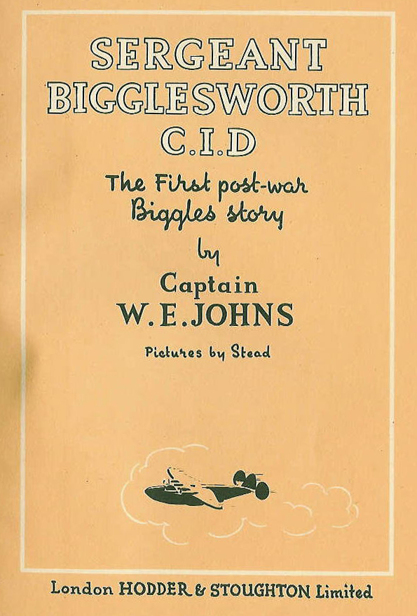
CRIME A LA MODE
THE station headquarters of "Biggles's Squadron," R.A.F., wore an air of abandoned disorder, like a cinema when the last of the audience has gone and only the staff remain.
Cupboard doors gaped, revealing bare shelves; the blackout blind sagged at one end; ashes of the last fire littered the grate; books and papers, tied in bundles with string, made an untidy pile in a corner.
Squadron-Leader Bigglesworth, known throughout the R.A.F. as "Biggles," tilted back in a chair with his legs on the desk from which the letter trays had been removed. Flying-Officer "Ginger" Hebblethwaite had perched himself on a corner of it, one leg swinging idly. Flight-Lieutenant Algy Lacey sat in reverse on a hard chair, elbows on the back, chin in his hands. Flight-Lieutenant Lord Bertie Lissie leaned out of the open window regarding the forsaken landing-ground with bored disapproval. Biggles took out his cigarette-case, selected a cigarette, and tapped it on the back of his left hand with pensive attention.
"Well, chaps, I think that's all," he remarked. "The war's over. We can either proceed on indefinite leave while the Air Ministry is sorting things out, or we can ask for our demobilisation papers, go home, and forget all about it. I must admit that this feeling of anti-climax is hard to take. There doesn't seem to be any point in doing anything. I feel like a cheap alarm clock with a busted mainspring."
"We shall have to do something," observed Ginger moodily.
"You've said that before," reminded Biggles, wearily.
"There will be civil flying," put in Algy.
"The only excitement you're likely to get out of that is dodging the ten thousand other blokes who'll be doing the same thing," sneered Biggles.
_"They've shot all the bally foxes, so there won't be any huntin' for a bit," sighed Bertie from the window. He leaned forward, gazing up the deserted road. "I say, chaps, there's a jolly old car coming," he observed. "I can see a bloke in a bowler."
"Some poor sap got off the main road and lost his way," suggested Algy without enthusiasm.
"No, by jingo, you're wrong old boyabsolutely wrong," declared Bertie. "Strike me horizontal! If it isn't the Air Commodore, Raymond himself, no less. Coming to see that we're leaving everything shipshape and what-not, I suppose."
"If he's in civvies he must be out of the service already," said Biggles, with a flicker of interest.
Air Commodore Raymond stopped the car, got out, and strode to the door of the squadron office. For a moment he stood on the threshold, smiling faintly as he regarded the officers in turn.
"What's this?" he inquired. "An undertaker's parlour?"
Biggles took his feet off the desk and pulled up a vacant chair. "Take a pew, sir," he invited. "We're all washed up and browned off. Apart from an N.C.O. and a small maintenance party, what you see is all that remains of the squadron. Nice of you to run down to say good-bye. We should have departed an hour ago had we been able to think of somewhere to go."
"Haven't decided on anything yet, then?" murmured the Air Commodore as he sat down.
"We've got to do something," interposed Ginger. Biggles considered him with disfavour.
"If you say that again I'll knock your block off," he promised.
"Well, what are you going to do?" inquired the Air Commodore.
"That," returned Biggles slowly, "is a question that should baffle the Brains Trust."
"Why?"
"Because there isn't any answerat any rate, not at present. No doubt something will turn up, sooner or later."
"I may have brought the answer," suggested the Air Commodore softly.
Biggles's eyes narrowed. "Are you kidding?"
"No," answered the Air Commodore evenly. "By the way, you may be interested to know that I'm back at my old job at Scotland YardAssistant Commissioner."
"Congratulations," offered Biggles. "You didn't lose much time getting out of your war-paint."
"There wasn't any time to lose," was the terse reply. "My chief was shouting for me, so the Air Ministry let me go right away."
"Has this anything to do with your coming down here?"
"I didn't rush down to gaze at a row of empty hangars,"
declared the Air Commodore. "I've got a proposition." "We're listening," asserted Biggles. "Almost anything,
bar directing the traffic in Trafalgar Square, will suit me." "Good. I've got a job I think you can handle. Suppose
I run over the main features?"
"Go ahead, sir," invited Biggles.
"When I went to the Yard last Monday to resume my duties, I soon discovered why the Commissioner was shouting for me," began the Air Commodore. "Before an hour was out I had taken over a, case that is unique to the point of being startling. Naturally, even while the war was on I realised that as soon as it was over we should have flying crooks to contend with. With fifty thousand menand womenof different nationalities, able to fly
aeroplanes, that was pretty obvious; but I confess I didn't expect a racket to start so soon; nor did I visualise anything on the scale that I shall presently narrate. In view of my air experience, the Commissioner hinted some time ago that he would ask me to undertake the formation of a flying squadin the literal sense. The idea was to start with a few fully trained men and build up. We've some good officers at the Yard, but, of course, they're not experts in technical aviation. We shall have to start with youngsters and teach them aviation as well as police procedure. But that's by the way. My flying days are past, I'm afraid, so my position is really that of organiser." The Air Commodore took one of Biggles's cigarettes.
"Obviously, the formation of such a force as we envisage will take time," he continued.
"In the meanwhile, a smart crook, or a gang, is gathering a nice harvest with comparative impunity. The thing is urgent, and seriousso serious that I have slipped down to ask you if you would co-operate with me until we can get properly organised, equipped to deal with the new menace. You had better hear the story before you commit yourselves."
"Let me get one point clear, sir," interposed Biggles. "Should we handle this job as officers of the R.A.F., or as civilians, or policeor what?"
"For pay and discipline you would come under the Yard, so it would mean leaving the Air Force. If you were willing I should enrol you in the Auxiliary Police, special service branch, attached to my department at the C.I.D. It would mean a drop in rank, pro tem.
The best I could do for you would be detective-sergeant."
Biggles smiled. "That would be fun," he murmured. "Just think how my lads would laugh to see me sporting three stripes."
"You wouldn't necessarily have to wear uniform," the Air Commodore pointed out.
"Plain-clothes men, what-ho," said Bertie softly.
"You've been reading thrillers," accused the Air Commodore. "You can call yourself what you like as far as I'm concerned if you'll nab these winged highwaymen. But really, this is no joking matter. If you're interested I'll run briefly over the facts." The Air Commodore settled back in his chair.
"The thing started three weeks ago, before the ink on the peace papers was properly dry, so to speak," he resumed. "From that fact alone we may assume that the scheme was already cut and dried. It began in the Persian Gulfof all places; and here we see at once how aircraft are going to enable crooks to extend their range of operations. As you probably know, Bigglesworth, once a year the big Indian jewel buyers go up to the Persian Gulf ports to bid for the pearl harvest. Between them they buy all the best stuff.
Next pageFont size:
Interval:
Bookmark:
Similar books «Sergeant Bigglesworth C.I.D: The first post-war Biggles story»
Look at similar books to Sergeant Bigglesworth C.I.D: The first post-war Biggles story. We have selected literature similar in name and meaning in the hope of providing readers with more options to find new, interesting, not yet read works.
Discussion, reviews of the book Sergeant Bigglesworth C.I.D: The first post-war Biggles story and just readers' own opinions. Leave your comments, write what you think about the work, its meaning or the main characters. Specify what exactly you liked and what you didn't like, and why you think so.

